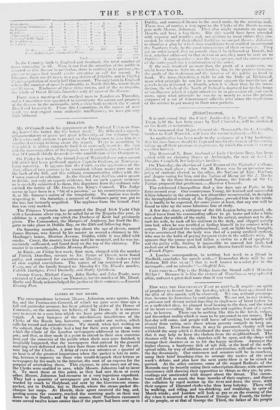CLERKS OF THE ROADS.
The correspondence between Messrs. Johnston, news agents, Dub- lin, and the Postmaster-General, of which we gave some time ago a full and particular account, has been printed by order of the House of Commons, on the motion, we believe, of Mr. Hume. It is unneces- sary to revert to a case into which we have gone already at so great length. A new instance of the mischievous interference of the Clerks of the Roads has, however, come under our notice, which calls for record and animadversion. We stated, when last writing on the subject, that the Clerks had a bag for their own private nap, into which the whole of the London newspapers addressed to them were put; and that, as they made it a point to attend to their own concerns first, and the concerns of the public when their own were finished, it invariably happened, that the newspapers that arrived by the general mail-bag were delivered much later than those which came by the pri- vate bag of the Clerks. A delay of even ten minutes or a quarter of lin hour is of the greatest importance when the packet is late in arriv- ing, because it imposes on those who would despatch their letters or newspapers by the mails to the interior, the cost of an express for the purpose of overtaking them. This expense, in nine cases out of ten, the Clerks were enabled to save, while Messrs. Johnston had to incur it. To meet them at this point, as they had met tlum at every .other, Messrs. Johnston bad-recourse to a very ingenious expedient. They had a quantity of newspapers put into a bag in London, for- warded by coach to Holyhead, and sent by the Government steam- 'packet, not to Dublin, but to Howth, where the steam-packet dis- charges her cargo. At Howth, their agent received the bag, and, posting across the country, reached the morning mails on their way -down to the North ; and by this means, their Northern customers were. served twelve hours sooner than if the papers had been sent up to 1)ublin, and conveyed thence in the usual mode, by the evening mall. There was, of course, a way open to the Clerks of the Roads to com- pete with Messrs. Johnston. They also might maintain an agent at Howth, and have a bag there. But this Nvould have been attended with expense and trouble ; and, not wishing to incur either, they pm- eeeded, by virtue of their (ffiicial tlicilit:es, to vompel Messrs. Johnston to abandon a plan by whilt they would have }woo enabled to eommand the Northern trade, to the great convenience of their ens:towers. They got an order issued, that no parcels should be delivered at liowth, but that, whether addressed to that station or tun, they must be sent on to ktblin! A correspandee.::. was the consequence, and the consequence of the cOtrespotidoIcce o ronfirmation of the order.
If the ease invoh:ed no more than the 111.0 lit of a tradesman, we might leave him to Ii hit his own battles; but, in the present instance, the profit of the tradesman and the interest of the public go hand in hand. We have, therefiffe, a right to ask the Duke of Richmond, upon what principle he can for a moment support the interdiction of parcels being delivered at tIc wth, when it is clear that, by the inter- diction, the whole of the North of Ireland is deprived for twelve hours of intelligence which it might otherwise be in possession of; and ntueb. more, upon what principle ins can do so merely to serve the private purposes of a set of Government officials, who abuse the regulations of the service to put money in their own pockets.


























 Previous page
Previous page